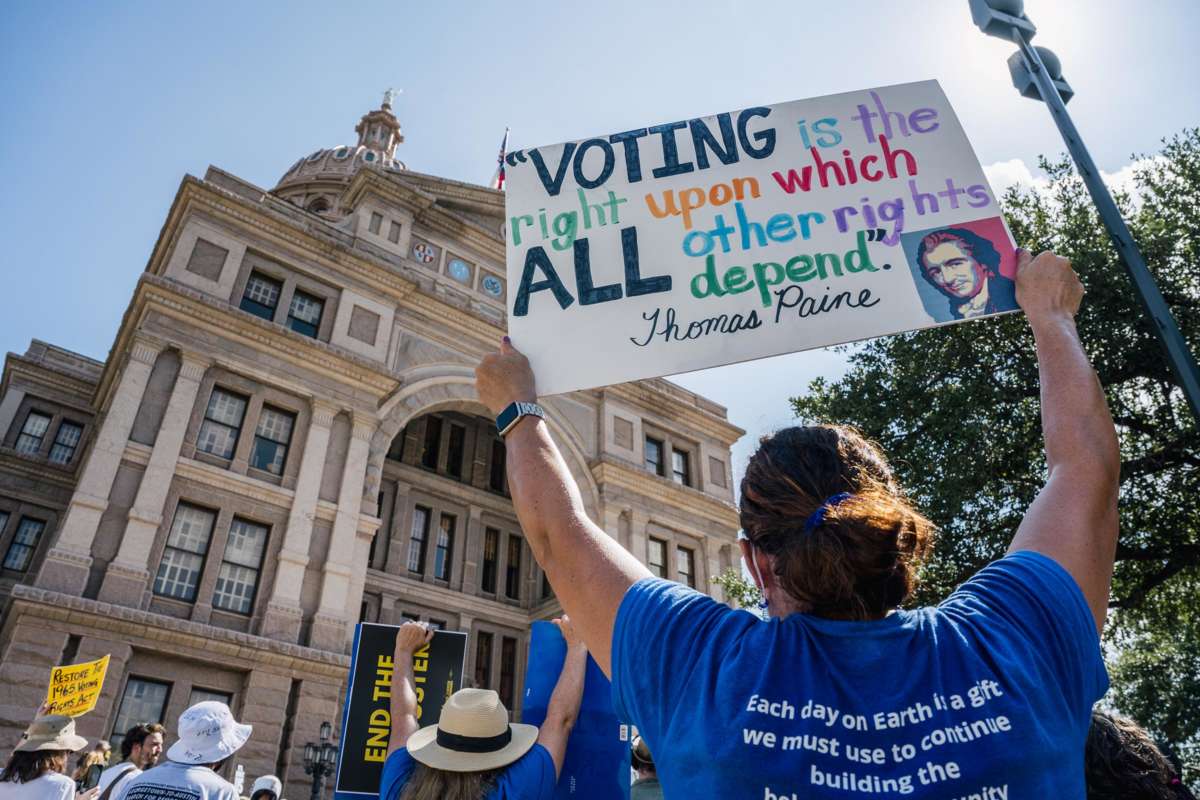Honest, paywall-free news is rare. Please support our boldly independent journalism with a donation of any size.
Texas’s Republican Gov. Greg Abbott signed a bill into law on Monday that advocates say will make it even harder to vote in the state already ranked the most restrictive for voter access, especially for Black and brown communities and people with disabilities.
S.B.1 places restrictions on mail-in and early voting, two subjects of particular ire for Republicans since the record turnout for the 2020 elections across the country and the unfounded attacks on the election’s integrity by former President Donald Trump who lost by a substantial margin to President Joe Biden. It bars 24-hour voting and drive-through voting, two early voting measures put in place by the largely Democratic Harris County during the last presidential election to help stem the spread of COVID-19 at voting sites.
The law, for which Abbott had called a special session of the legislature to pass, puts new restrictions on voter ID for mail-in voters and empowers partisan poll watchers at polling sites. It makes it harder for people with disabilities and people who need a translator to vote by creating hurdles for people who help people with their ballots. Such assistants are also no longer allowed to be paid as the bill has made it a crime to do so.
Republicans have also now placed greater restrictions on election workers, barring election officials from sending out unsolicited mail-in ballot applications and creating criminal penalties for officials who may step out of line.
The sweeping new law is expected to have a chilling effect on voters in the state, and appears to place restrictions specifically on provisions like 24-hour voting that in the past helped people with nontraditional work hours and nonwhite people to cast a ballot.
Several organizations have already filed lawsuits against the state over the law. Local voting rights organizations and branches of the National Association for the Advancement of Colored People (NAACP) have filed suits. The Brennan Center for Justice also filed a suit last week, alleging that the bill violates several laws, including the Voting Rights Act; the First, Fourteenth and Fifteenth Amendments; and the Americans with Disabilities Act.
“[O]ur plaintiffs embody a cross section of Texans, representing the interests of Black and Latino communities, voters with disabilities or language limitations, and all Texans who want to protect free and fair elections,” the Brennan Center wrote. “S.B.1 undermines that goal by placing a slew of new restrictions on voting and elections administration.”
Lisa Cylar Barrett, director of policy at the NAACP Legal Defense and Educational Fund, which also filed a lawsuit, called the state’s history of voter suppression “shameful” in a statement. “Passage of S.B.1 by the Texas legislature, and its signing into law by Governor Abbott, is a clear attack on our democracy and the rights of Black and Brown voters — who turned out in record numbers across Texas during the 2020 election season — to cast a ballot and have it counted.”
Democrats in Congress have the opportunity to right the course from Texas’s voter suppression law that Texas Democrats have pleaded for. The For the People Act would protect voting rights for millions of Americans, especially marginalized people. But the filibuster — and a few key conservative Democrats — stand in its way.
Media that fights fascism
Truthout is funded almost entirely by readers — that’s why we can speak truth to power and cut against the mainstream narrative. But independent journalists at Truthout face mounting political repression under Trump.
We rely on your support to survive McCarthyist censorship. Please make a tax-deductible one-time or monthly donation.
